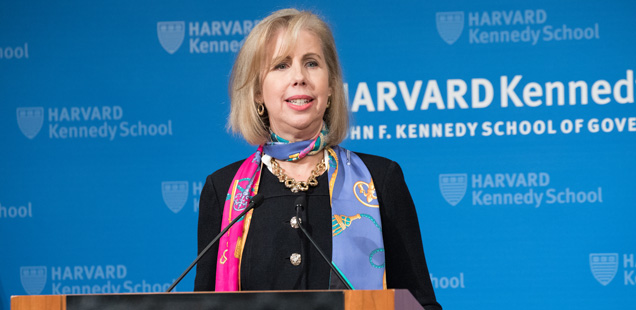Our weekly roundup of news found at the intersection of media, politics, policy and technology, from the Shorenstein Center and from around the web. Sign up to receive Media and Politics Must Reads in your inbox each week. Also connect with us on Twitter and Facebook for more updates.
This Week at the Shorenstein Center
Theodore H. White Lecture on Press and Politics with Nancy Gibbs: “The Divided States of America.” Nancy Gibbs, editorial director of Time Inc. News Group and former editor of Time Magazine, delivered a thought-provoking speech on American values, polarization, and the impact of social media and journalism. Also at the event, Kevin Cullen, Boston Globe columnist, received the David Nyhan Prize for Political Journalism. Watch the video.
Edward Morris: Art and Activism. Edward Morris, Professor of Practice in the Department of Transmedia at Syracuse University’s College of Visual and Performing Arts, discussed how art can complement and further the goals of activism.
News from Fellows and Students
Could Russian trolls have helped elect Donald Trump? Kathleen Hall Jamieson, Joan Shorenstein Fellow, writes that “We also don’t know how social media amplification and news media preoccupation with the Russia-hacked Democratic National Committee and Clinton campaign emails affected voters’ perceptions of Clinton. But the wide distribution of strategically aligned messages increases the likelihood that Russian efforts — including posts, ads, tweets and the release of stolen emails — changed the outcome of the 2016 election.”
How did the news go ‘fake’? When the media went social. Claire Wardle, Research Fellow, and Hossein Derakhshan write that “Consumption of the news has become a performance that can’t be solely about seeking information or even entertainment. What we choose to ‘like’ or follow is part of our identity, an indication of our social class and status, and most frequently our political persuasion. When we try to understand why people are sharing misleading, manipulated and fabricated information, we need to appreciate that those shares and retweets are playing an incredibly important function, which is less about their veracity or truth.”
Research on CrossCheck journalists and readers suggests positive impact for project. In the unease that followed a U.S. election in which voters were bombarded with mis- and dis-information, First Draft, founded by Claire Wardle, pulled together 37 newsrooms, universities, nonprofits and tech companies to fight rumors and fabrications around what was widely perceived to be their next target: the 2017 French presidential election. This project, called CrossCheck, has now been evaluated by independent researchers, through a series of in-depth interviews with CrossCheck journalists and readers. A new report released this week indicates that CrossCheck appears to have gained the trust of a large and politically diverse audience. Participating journalists learned to be smarter about when and how to report on falsehoods, and journalists and readers learned valuable skills for assessing information and its sources.
Donna Brazile Criticizes Clinton Camp In Campaign Memoir. Donna Brazile, Joan Shorenstein Fellow, discusses her new book on NPR’s Weekend Edition, and weighs in on where the Democratic Party should go next. “I want my party to lead, I want my party to be victorious at the ballot box as you saw last week … but I also want my party to learn from the mistakes of the past.”
What Hillary Knew About Putin’s Propaganda Machine. Richard Stengel, former Walter Shorenstein Media and Democracy Fellow, writes that “Russian disinformation around Ukraine set the stage for the Kremlin’s election meddling here. Clinton saw it coming, but couldn’t stop it.”
China’s rise didn’t have to mean America’s fall. Then came Trump. Zachary Karabell, fall 1997 fellow, writes that “There’s room for two superpowers to maintain influence in Asia and beyond. But in his nearly-completed first year in office, culminating in last week’s trip abroad, Trump has nearly ceded the field to China.”
Facebook’s Russia Problem Proves Feds are Missing the Point. HKS student Matthew Spector writes that “Rather than applying blanket rules to tech companies’ growth, Congress must mandate the platforms’ data be made accessible enough that their uses, and users, can be regulated, and consumers themselves are empowered to opt-out.”
2016 Election Reflection: The Parties One Year After Donald Trump. A special series from the Kennedy School Review, an HKS student publication. Voters on both sides of the aisle take stock of how their party has changed over the past year and provide input on where it should head.
New Findings on News and Social Media
- 48 News Outlets Experimented For Five Years To See What Drives Twitter Politics, from BuzzFeed News.
- New research: Small-market newspapers in the digital age, from the Tow Center for Digital Journalism.
- After a decade, it’s time to reinvent social media in newsrooms, from American Press Institute.
- Manipulating Social Media to Undermine Democracy, from Freedom House.
- How social media fires people’s passions – and builds extremist divisions, from The Conversation.
Battling Misinformation
- ‘Way too little, way too late’: Facebook’s factcheckers say effort is failing, from The Guardian.
- EU to Beef Up Efforts to Counter Fake News, from Fox Business.
- Somaliland is blocking social media to keep its election free of “fake news,” from Quartz.
Media Business
- Newsonomics: The New York Times’ Mark Thompson on regulating Facebook, global ambition, and when to stop the presses (forever), from Nieman Lab.
- Here’s why your local TV news is about to get even worse, from The Conversation.
- The video push against Google and Facebook, from Axios.
- In Search of a Healthy Future, Alt Weeklies Experiment with Stories and Revenue Strategies, from Editor & Publisher.
Workplace Harassment
- The News Industry Has a Sexual Harassment Problem. #NowWhat? From Nieman Reports.
- Reflections of an Affirmative-Action Baby, from The Atlantic.


